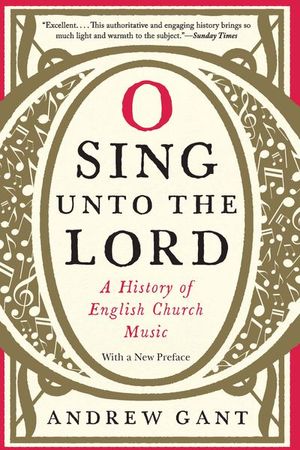O Sing unto the Lord
Published by The University of Chicago Press
This history of English church music is “one of the wittiest and most whimsically irreverent works of scholarship in recent memory” (The Christian Century).
For as long as people have worshipped together, music has played a key role in church life. Here, Andrew Gant offers a fascinating history of English church music, from the Latin chant of late antiquity to the great proliferation of styles seen in contemporary repertoires.
The ornate complexity of pre-Reformation Catholic liturgies revealed the exclusive nature of this form of worship. By contrast, simple English psalms, set to well-known folk songs, summed up the aims of the Reformation with its music for everyone. The Enlightenment brought hymns, the Methodists and Victorians a new delight in the beauty and emotion of worship. Today, church music mirrors our multifaceted worldview, embracing the sounds of pop and jazz along with the more traditional music of choir and organ. And reflecting its truly global reach, the influence of English church music can be found in everything from masses sung in Korean to American Sacred Harp singing.
From medieval chorales to “Amazing Grace,” West Gallery music to Christmas carols, English church music has broken through the boundaries of time, place, and denomination to remain familiar and cherished everywhere. O Sing unto the Lord is the biography of a tradition, a book that “celebrates the sheer pleasure of raising a joyful sound to the Lord” (The Guardian).
“What, fundamentally, is the function of church music, and why have clerical authorities often been suspicious of how much attention music receives? Gant engages these questions in intelligent, energetic prose.” —Publishers Weekly
“Excellent . . . this authoritative and engaging history brings so much light and warmth to the subject.” —Sunday Times
“The beauty of relating Christian history this way is that it broadens the focus to include the listening laity, not just the clergy or the church establishment.” —Foreword Reviews
For as long as people have worshipped together, music has played a key role in church life. Here, Andrew Gant offers a fascinating history of English church music, from the Latin chant of late antiquity to the great proliferation of styles seen in contemporary repertoires.
The ornate complexity of pre-Reformation Catholic liturgies revealed the exclusive nature of this form of worship. By contrast, simple English psalms, set to well-known folk songs, summed up the aims of the Reformation with its music for everyone. The Enlightenment brought hymns, the Methodists and Victorians a new delight in the beauty and emotion of worship. Today, church music mirrors our multifaceted worldview, embracing the sounds of pop and jazz along with the more traditional music of choir and organ. And reflecting its truly global reach, the influence of English church music can be found in everything from masses sung in Korean to American Sacred Harp singing.
From medieval chorales to “Amazing Grace,” West Gallery music to Christmas carols, English church music has broken through the boundaries of time, place, and denomination to remain familiar and cherished everywhere. O Sing unto the Lord is the biography of a tradition, a book that “celebrates the sheer pleasure of raising a joyful sound to the Lord” (The Guardian).
“What, fundamentally, is the function of church music, and why have clerical authorities often been suspicious of how much attention music receives? Gant engages these questions in intelligent, energetic prose.” —Publishers Weekly
“Excellent . . . this authoritative and engaging history brings so much light and warmth to the subject.” —Sunday Times
“The beauty of relating Christian history this way is that it broadens the focus to include the listening laity, not just the clergy or the church establishment.” —Foreword Reviews
BUY NOW FROM
COMMUNITY REVIEWS
